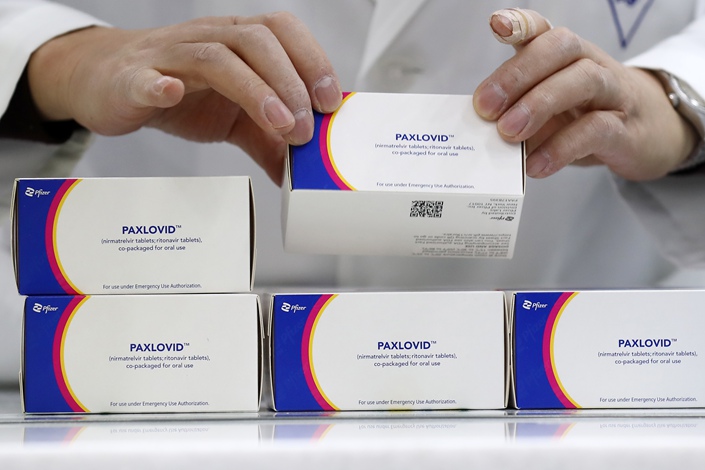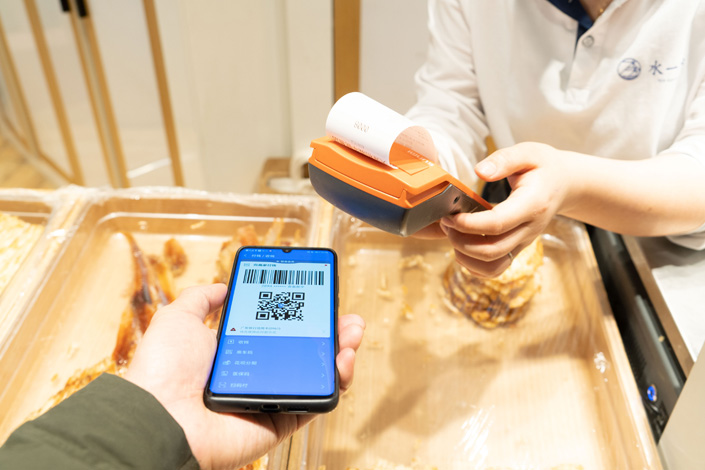CX Daily: Could Pfizer’s Drug Paxlovid Change China’s Covid Policy?

Pfizer /
In Depth: Could Pfizer’s drug Paxlovid change China’s Covid policy?
China’s approval for the import of Pfizer’s new Covid-19 drug surprised many.
The National Medical Products Administration’s (NMPA) conditional approval for Paxlovid came with unprecedented haste, especially given how bearish the country has been on foreign-made Covid-19 treatments. The green light came Feb. 12, barely two months after the U.S. Food and Drug Administration signed off on it.
The news stirred up questions about the country’s strict Covid-Zero policy and led to a surge in the prices of once sluggish coronavirus drug concept stocks. Investors have since turned bullish on Chinese companies working on similar products as well as drug ingredient producers — regardless of whether they have a clear connection to Paxlovid.
Women's rights /
Shackled mother was sold into forced marriages at least three times, probe finds
East China’s Jiangsu province Wednesday released the much-anticipated results of an investigation into the case of a shackled mother of eight that determined she had been abducted from her hometown in 1998 and sold at least three times into forced marriages.
The high-profile case of the shackled woman, identified as 44-year-old “Xiaohuamei” from Southwest China’s Yunnan province, has led to a month-long public uproar over the grim conditions of the woman and refocused nationwide attention on the issue of human trafficking.
FINANCE & ECONOMY
A customer shows his Alipay QR code to a cashier in Dalian, Northeast China’s Liaoning province, in April 2021. Photo: VCG
Payment /
China loosens new mobile payment rules to put small businesses at ease
China is taking a more moderate approach to strengthening management of the mobile payment market in response to complaints that central bank rules announced in October could push operating costs up for small-business owners.
Payment platforms will roll out new merchant barcodes for businesses to receive payments, according to a statement released Tuesday by the Payment & Clearing Association of China, a self-regulatory industry organization supervised by the People’s Bank of China (PBOC). Businesses will be free to choose whether to use the new codes or continue to use their personal codes as before.
Under the original rules released by the PBOC, set to take effect March 1, business owners would be barred from using personal codes for business purposes.
Corruption /
Former boss of Citic Bank admits taking $154 million of bribes
Sun Deshun, former president of state-owned China Citic Bank, pleaded guilty Tuesday to allegations of taking nearly 1 billion yuan in bribes.
The sentence will be pronounced at a later date, according to the trial court in Jinan, Shandong province.
Sun, 63, was accused of using his positions in several state-owned banks to offer favorable loans and credit to businesses between 2003 and 2019 in exchange for bribes totaling 980 million yuan ($154 million).
Bankruptcy /
Beijing firm seeking control of Ukrainian engine giants goes bankrupt
A Beijing court assigned a law firm to manage the bankruptcy of Beijing Xinwei Technology Group, setting off a procedure to wind down a company that had sought to take control of Ukrainian engine manufacturer Motor Sich.
The Beijing No. 1 Intermediate People’s Court appointed Haiwen Law Firm Tuesday as the bankruptcy liquidation administrator for Beijing Xinwei, court documents showed. Creditors can file debt claims by May 5.
Tax evasion /
China’s big data catches another livestreamer evading taxes
Ping Rong, an e-commerce livestreamer who had 24 million followers on Kuaishou, a video-sharing and livestreaming app, was hit with a financial penalty of 62 million yuan ($9.8 million) to cover fines for tax evasion, overdue taxes and fees for late payment, the Guangzhou tax bureau said Tuesday.
Ping is the latest in a string of high-profile tax evasion cases in the livestreaming industry to be exposed after local authorities used “big data tax analysis” to alert them to potential transgressions.
Quick hits /
Opinion: How the Ukraine crisis will affect the yuan and other currencies
Veteran diplomat to serve as China’s new envoy to troubled African region
Analysis: How Hong Kong failed to maintain ‘zero Covid’
BUSINESS & TECH

Coal /
Chart of the Day: China’s coal miners pile up record $111 billion in profit
China’s coal mining sector doubled its profits last year as the nation’s pandemic recovery ramped up demand for the pollution-emitting fuel source.
Coal mining companies posted 702.3 billion yuan ($111 billion) in profit for 2021, a figure that soared 213% year-on-year, figures from the National Bureau of Statistics (NBS) showed. The surging earnings also made it the third-most profitable sector tracked by the bureau, behind electronics and communication-equipment makers and chemical products manufacturers.
LNG /
Global LNG supply will fall 100 million tons short by mid-2020s
The gap between supply and demand for liquefied natural gas (LNG) will reach 100 million tons a year globally by the mid-2020s, reflecting increased demand and limited supply growth, global oil and gas giant Shell said Monday in its latest annual LNG outlook report.
Global trade in LNG expanded 6% in 2021 to 380 million tons as economies rebounded from the Covid-19 pandemic. Demand is expected to almost double to 700 million tons a year by 2040, Shell said in the report.
Data /
Data center operator GDS to raise $620 million as government reveals growth plans for sector
Money-losing data center operator GDS Holdings Ltd. is looking to raise $620 million to fund its expansion, a move that comes shortly after the Chinese government announced plans to massively expand the country’s data processing infrastructure.
The money will be raised through a private placement, with the Hong Kong-listed company planning to sell convertible senior notes to a group of big-name institutional investors including Sequoia China Infrastructure Fund, ST Telemedia Global Data Centers and an unnamed Asian sovereign wealth fund, GDS said in an exchange filing on Tuesday. Due in 2029, the notes carry an interest rate of 0.25%.
Education /
China’s largest private tutor sinks $907 million into the red after transformative new rules
China’s largest private tutoring provider sank $907 million into the red in the six months through November after the government sprang sweeping changes on the after-school education industry.
To comply with new rules, New Oriental Education & Technology Group Inc. has ceased all of its tutoring services related to K-9 academics, which has had a “substantial adverse impact” on earnings, according to its Tuesday filing to the Hong Kong bourse.
GALLERY
Hong Kong steps up battle against Covid-19
Recommended newsletter for you /
China Green Bulletin Premium - Subscribe to join the Caixin green community and stay up to date with the most exclusive insights on ESG, energy and carbon. Sign up here.
Thanks for reading. If you haven’t already, click here to subscribe.
- MOST POPULAR




